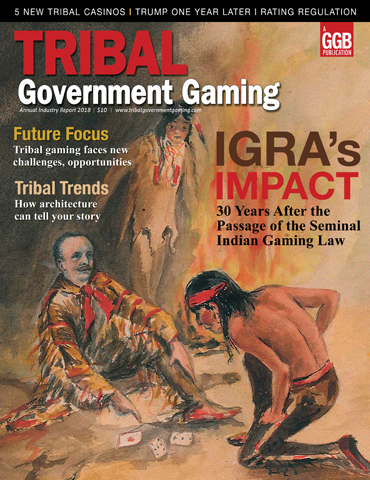
Prior to Indian gaming, economic opportunities—if there were any—on U.S. reservations were primarily limited to resource-extraction industries. Tribes struggled with high levels of poverty, unemployment and substance abuse, while trying to earn self-sufficiency through any means possible.
Then came the Indian Gaming Regulatory Act (IGRA), and opportunities finally broadened. Revenue from gaming has allowed many tribes to achieve a level of economic self-sufficiency only imagined 30 years ago. After opening their own casinos, tribes have surpassed their own short-term goals by creating and operating their own corporations, achieving true economic independence.
In this article, we examine the impact of IGRA through the experiences of key officials with the Bear River Band of Rohnerville Rancheria and the Mille Lacs Band of Ojibwe. Although these tribes are very different in number of members and scale of casino development, gaming has allowed both to improve tribal services and broaden economic opportunity.
THEN
First, some background. Large-scale tribal gaming started in the early 1980s on the heels of Bryan v. Itasca, a landmark victory for sovereignty wherein the U.S. Supreme Court in 1976 effectively ruled that state governments do not have “general state civil regulatory control over Indian reservations.”
Bryan set precedence in several disputes involving bingo, including Seminole Tribe v. Butterworth, which kept the tribe’s high-stakes bingo hall in Broward County open and running, as well as the crucial tribal victory in California v. Cabazon Band of Mission Indians, a dispute arising when law enforcement officials shut down the Cabazon Band’s bingo parlor and poker hall in 1986.
The legal battle that followed laid down the framework that eventually became the Indian Gaming Regulatory Act.
In Cabazon, the state argued that under Public Law 280, California was allowed criminal jurisdiction over Native American tribal lands within the state’s borders. The Cabazon Band argued in reference to Bryan that the state’s regulatory laws did not criminally prohibit gambling; therefore, the authority to regulate such gaming activities was outside the control of Public Law 280.
In the center of this case was Glenn Feldman, attorney for Cabazon, who has represented the tribe for more than 40 years. Dating back to 1979, he had been working with the tribe to develop their own means of economic independence. After several failed ventures, gaming seemed to be the last opportunity on which they could fully capitalize. Legislation had surfaced back in the early 1980s to either regulate or outlaw tribal gaming, and with proponents on both sides of these bills, discussions on Capitol Hill had been intense.
However, as Feldman tells it, “In June of 1986 when the Supreme Court stated they would hear the Cabazon case, all discussion and negotiations basically came to a halt.” Many predicted the Supreme Court would rule against the Cabazon Band, and all but eliminate any chance of tribal gaming.
However, the Supreme Court ruled in favor of Cabazon. This set a precedent for other states, and tribal reservation gaming could only be called into question in states where gambling was deemed criminal by state law. Feldman saw the tribe’s victory as the boost that prompted Congress to add some sort of federal regulatory framework, since the ruling effectively removed state control.
Enacted in 1988, “IGRA was a classic compromise,” according to Feldman. “Nobody got everything they wanted, and everyone agreed to things they didn’t like but could live with.”
The bill created a federal regulatory structure, putting total regulatory framework at the federal level while still giving the states a role to play in compact negotiation. Though controversial at the time, the compromise did not completely satisfy tribes, according to Feldman, but most accepted it as basis on which to move forward.
NOW
Fast forward 30 years. The National Indian Gaming Commission (NIGC) as created by IGRA is still in place and controls the regulatory mandate. Little did Feldman know that the case he argued all the way up to the Supreme Court in the late 1980s would pave the way to what has become more than a $30 billion-a-year industry.
Economic independence is the main reason for IGRA. Hundreds of tribes around the country have taken advantage of what IGRA offers. Tribes located along major thoroughfares in large markets have built Las Vegas-sized facilities, generating millions in revenue for the tribes and their members. Others, though still prominent in the gaming space, have taken advantage of some of the perhaps unforeseen advantages of IGRA. Worth highlighting in particular are John McGinnis and the Bear River Band of Rohnerville Rancheria, and Joseph Nayquonabe and the Mille Lacs Band of Ojibwe.
BEAR RIVER SAGA
 The story of the Bear River Band of Rohnerville Rancheria’s (Bear River) success cannot be told without discussion of the significant contributions made by John McGinnis; however, the story must begin prior to his involvement. In fact, it dates back to the California Rancheria Termination Act of the 1950s and 1960s. Bear River was a terminated and landless tribe, and was not reinstated until 1983, after which they spent years working out of an old building in Eureka, California. Not until 1991 did grant money allow Bear River to relocate to its current location in Loleta, California.
The story of the Bear River Band of Rohnerville Rancheria’s (Bear River) success cannot be told without discussion of the significant contributions made by John McGinnis; however, the story must begin prior to his involvement. In fact, it dates back to the California Rancheria Termination Act of the 1950s and 1960s. Bear River was a terminated and landless tribe, and was not reinstated until 1983, after which they spent years working out of an old building in Eureka, California. Not until 1991 did grant money allow Bear River to relocate to its current location in Loleta, California.
A young tribal member by the name of John McGinnis was working odd jobs until he landed a position with the United States Census as the first Native American liaison. The Department of Commerce used McGinnis to help other tribes around the country who did not want to work with the United States government for obvious reasons. This job was paramount in that he represented both himself and his small Northern California tribe. His true calling was to his tribe, particularly to the young and elderly members, and this is what brought him back to Bear River.
In 2000, McGinnis began writing grants for the tribe to help support the youth and elderly, but he had larger ideas. Bear River got its compact in 1999.
“We were tinkering with the idea of opening a casino, as this was the first real chance at true economic self-sufficiency for the tribe,” says McGinnis.
In 2003, he was appointed executive director of gaming for the tribe. Opening a casino became his primary mission with his team. After the red tape, the late nights, the lawyers, the banker meetings and the training, the Bear River Casino opened August 10, 2005, just over two years after the mission began—an amazing feat in and of itself, McGinnis says. “It was history in the making. We were the first tribe in the area to actually close down the highway with the amount of business we were getting.”
That is when the real work began. In 2005, McGinnis moved to operations as assistant general manager and by 2006, through some unforeseen circumstances, he assumed the role of general manager. By this time, McGinnis was doing exactly what he had worked toward so many years ago. He was helping his tribe toward economic independence. However, not every story moves forward without a bump in the road. After moving McGinnis to the director of slot operations position, the tribe as a whole became the casino’s general manager. Down, but never out.
McGinnis worked as the director of slot operations until 2012. Feeling it was time to shift lanes but stay the course, McGinnis was elected to the tribal council. So many people believed in what he had done at the casino that they wanted to see what he could do for the tribe on a broader scale. The casino may have been the vehicle that led to economic independence, but that was not the end goal. With the money that the casino was generating, the tribe could venture into other industries. Many felt McGinnis was in a good position to help them.
After joining the tribal council, McGinnis felt it would be best to bring the role of general manager back to one individual. He proposed a challenge, stating, “Bring in an industry expert with 20-plus years of experience and compare that to what I can do.” The tribe did just that, and McGinnis says, “Let’s just say the rest is history.”
McGinnis was reappointed general manager in 2015, and they took off “like gangbusters.”
McGinnis emphasizes that absolutely none of this would have been possible without IGRA. Poverty levels on the reservation were above 80 percent. Drug and alcohol dependence was high. For young tribal members, the future was bleak. But with the help of IGRA and the casino by proxy, the tribe has been able to grow. The casino itself created nearly 350 jobs, and more than 20 percent of those jobs are held by tribal members who gained not only employment, but training that applies to real-world experience. With these funds, new tribal offices were built and a strong social services department that worked toward the prevention of suicides and drug/alcohol abuse was developed.
A world-class recreation center for the local community was completed in 2016, as well as Northern California properties housing everything from residential to commercial and retail developments. IGRA has allowed Bear River, and other tribes like them, to be prominent, productive and supporting members of the local community.
It is important to note that IGRA was only half of the proverbial battle. These accomplishments were not handed out, but earned by those who stepped up to the plate when others would not. Although McGinnis is too humble to say it about himself, it’s evident that he was a vital piece of the large puzzle that Bear River needed to see the success that they are having today.
MILLE LACS SAGA
 One of the early entrants into the market following the passing of IGRA in 1988, the Mille Lacs Band of Ojibwe (Mille Lacs) opened its first casino in 1991. Joseph Nayquonabe Jr. was a mere 9 years old at the time, but he vividly remembers the feeling of excitement flowing through the tribe.
One of the early entrants into the market following the passing of IGRA in 1988, the Mille Lacs Band of Ojibwe (Mille Lacs) opened its first casino in 1991. Joseph Nayquonabe Jr. was a mere 9 years old at the time, but he vividly remembers the feeling of excitement flowing through the tribe.
He would look over a wall toward the casino in amazement and wonder where all of these people were coming from. Not until he was much older would he realize the real impact the casino would have on the tribe. Like many tribes around the country, poverty and unemployment were ridiculously high. The casino was the vehicle towards economic independence and a true source of pride for its tribal members. Nayquonabe knew from that early age that he wanted to be part of that experience. A plan was already in place, and Nayquonabe credits his parents for what came next.
Nayquonabe’s father had always emphasized the importance of gaining an education, and the tribe now had the means to give this to their youth, a privilege that they themselves had been denied. In fact, Nayquonabe’s father went back for his college degree, becoming the first member of his family to do so. The plan was to bring the learned skill set from college back to the reservation.
After acquiring a degree in marketing, Nayquonabe returned to help the casino move to new heights. After a short period, he was leading the casino’s marketing team and became corporate vice president of marketing by age 27, an impressive feat for such a young executive.
Quickly noticed for his casino work, he was asked to work toward the CEO position of Mille Lacs Corporate Ventures. But seeing this as a chance to check himself, he realized that his skill set at that time would not necessarily set him up for success in such a high-level position. Despite his strong confidence, Nayquonabe exuded true introspectiveness by determining that he wasn’t yet ready for this step. He instead acquired a master of business administration degree from the University of Minnesota, paving his way toward the skill set that attained him the role of CEO of Mille Lacs Corporate Ventures in 2012, a position he still holds today.
The casino is the economic vehicle to self-sufficiency and, without IGRA, would not have been possible. Nayquonabe is fully aware but also understands the volatility of gaming, and that it may not always be the financial lifeline that it has been for so many years.
He admits, “The Midwest region is one of the slowest growing gaming markets in the country. It is an extremely mature market, and saturated to a certain extent. Our tribal member numbers are growing, and casino revenues are flattening out, so a challenge was thrown down by the chief, to continue to grow the company alongside gaming.” This is what really got his gears turning.
Early on, the non-gaming aspects of Mille Lacs Corporate Ventures generated some top-line dollars, but mainly functioned as a tool of job creation for tribal members.
“At the end of the day, it was losing money,” Nayquonabe states. “If they had to pick between a business venture that either generated money or created jobs, the one that created jobs almost always won out.”
His plan was to find business opportunities that did both. He worked to help convince the tribe to not only have a community development path that was all about job creation, but to also have a capital development path that was purely about profit and investments outside of gaming.
“It was a ‘yes, and’ approach,” says Nayquonabe. “Yes, we can create jobs in our community and we very much believe in that. And we have to build capital.” Mille Lacs Corporate Ventures would be treated like a for-profit company. Business opportunities were out there, and it was up to the company to find them.
The company went on an acquisition spree. They acquired a marketing firm and hotels, even venturing into startups in the region. They also began helping tribes get into gaming for the first time or redevelop what they currently had, this time focusing more on sound business investments than pure job creation.
In the six years since this challenge was laid down by the chief, Nayquonabe and his team took non-gaming revenue figures of less than $10 million per year and increased them tenfold, including substantial profit margins. Nayquonabe’s key to success is doing what you know best.
“We are in hospitality because we know hospitality,” he says. “We are in those lanes because we already have expertise in those lanes. We don’t have to hit the home run; gaming is the home run. We are blessed to have gaming. Going back to IGRA, we are blessed to have an oligopoly and sometimes a monopoly in some areas in this form of entertainment. It is OK to go out and hit singles, and that is what we focus on today.”
Needless to say, Nayquonabe and the Mille Lacs have taken full advantage of what IGRA has offered and do not plan on stopping anytime soon.






